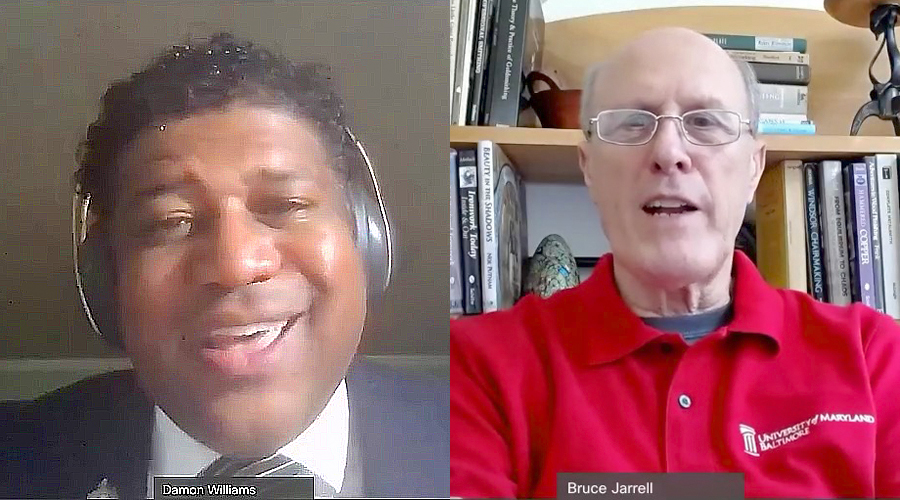July 2020
It was March 5 when Gov. Larry Hogan delivered the bad news that Maryland had experienced its first case of COVID-19. Within just three weeks, every activity at the University of Maryland, Baltimore (UMB) and most universities around the country was transformed, from telework and research restrictions to the cancellation of clinical placements and in-person didactic instruction.
It was during that time that Damon A. Williams, PhD, chief catalyst for the Center for Strategic Diversity Leadership & Social Innovation and author of the best-selling books Strategic Diversity Leadership and the Chief Diversity Officer, quickly published The COVID-19 Diversity, Equity, and Inclusion Crisis Action Strategy Guide, aimed at helping college and university leaders ensure they were including and supporting everyone they were trying to help and not further hurting or stressing them.

Dr. Damon A. Williams speaks with Dr. Bruce Jarrell
“This pandemic is fast becoming a defining world moment for our Generation Z students, much as 9/11 was for millennials. Too often in times of crisis, however, it is the under-represented and marginalized who bear the burden of sudden change,” Williams said.
In another section he added: “Wherever this situation takes us, we must respond with continued, even elevated, inclusive excellence. While a public health crisis, this situation at its core is a DEI [diversity, equity, and inclusion] crisis with the potential for flashpoints and serious damage at any moment — and it must be treated as such, in every step you and your institution take, in every communication.”
So, what does the term “inclusive excellence” mean? The Association of American Colleges and Universities says making excellence inclusive is “the guiding principle for access, student success, and high-quality learning. Through the vision and practice of inclusive excellence, the association calls for higher education to address diversity, inclusion, and equity as critical to the well-being of democratic culture.”
Williams’ strategy guide describes four key pillars to support a framework for action:
- Make culturally relevant decisions
- Support diverse communities
- Digitize inclusive excellence
- Communicate thoughtfully and inclusively
During the discussion July 16 with UMB Interim President Bruce E. Jarrell, MD, FACS, on the weekly webcast Virtual Face to Face with Dr. Bruce Jarrell, Williams explored the challenges facing higher education regarding support of diversity, equity, and inclusion during the COVID-19 pandemic.
Questions from the audience of mostly UMB community members ranged from the evolution of the anti-racism movement on college campuses, to the factors most important to creating long-term cultural changes, to the difficulty in keeping equity front-of-mind during a crisis.
Please watch the entire discussion by accessing the link above.
Search UMB News
Sign up for UMB Alerts.



